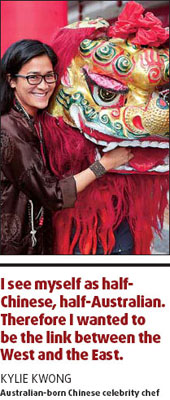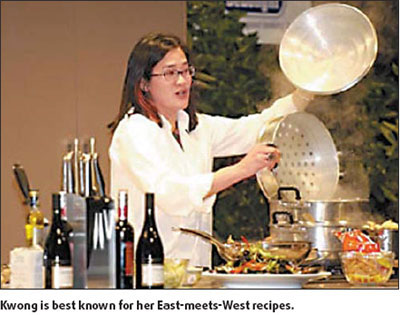"I see myself as half-Chinese, half-Australian. Therefore I wanted to be the link between the West and the East." A comment like this may seem rather ambitious for most people, yet from the mouth of Australian-born Chinese celebrity chef Kylie Kwong, it's not that farfetched.
As a restaurant owner, author, award-winning chef and fifth-generation Chinese-Australian, Kwong is renowned for cooking with irresistible energy and passion.
With a handful of successful cooking books on Chinese cuisine and her own popular cooking shows airing not only in her native Australia but also on TV screens around the world, Kwong attracts a lot of attention for her love of Chinese cuisine and her attempts to reconcile with her Chinese roots.
Now the 38-year-old has returned to the Middle Kingdom with My China, her newly published autobiographical book on cooking her way through the country to find her roots.
Still, the Chinese-Australian is pursuing the answer to one question which has always been on her mind: "Am I really Australian or am I more Chinese?"
Discussing her Chinese heritage, Kwong shared with China Daily what growing up in Sydney in the only Chinese family around meant to her.
Kwong speaks neither Mandarin nor Cantonese, yet since her first visit to China in 1998, she has returned 14 times to Beijing, Shanghai, Sichuan, Yunnan and Guangdong Provinces.
Although she did not set foot in China until she approached her 30s, Kwong's China connection stretches back to 1875 when her great-grandfather, Kwong Sue Duk (born in 1853), left his native village in South China's Guangdong Province to pursue the promise of gold in Australia.
Many years later, Kylie Kwong set out on an adventure to learn more about the character and personality traits of her ancestors. This brought her back to her grandfather's home village for an emotional encounter with a China radically different from her life as a celebrity chef.
Overwhelmed by the simplicity of life - amenities like running water and electricity had yet to find their way to the village - along with the warm hospitality of the villagers, Kwong cooked for and with the locals. The trip resulted in her recently published book My China.
Kwong's background is in graphic art design, not cooking. At the age of 24, after working in the advertising industry for several years, a cutthroat culture she never liked, Kwong scored a part time job with a contract caterer. The first day she worked in the kitchen was the day she suddenly realized how much she loved it.
"I loved every part of the food chain, so to speak, and from this day on I have never looked back," she says.
At the age of 26, Kwong got her first high-profile job with Neil Perry, the father of Australian cuisine, at the highly acclaimed Rockpool restaurant in Sydney's The Rocks area.
"Between my mom and Neil, they taught me so much. He rounded off my education by teaching me how to set up a restaurant," she says.
"He opened my eyes to Western ingredients. Mom taught me how to cook with heart and intuition."
From that point, Kwong's career took the fast track to stardom. Recalling how it was like in the early days of her success, Kwong stressed that for a young person starting out in their chosen field, there was nothing more fulfilling and encouraging than public recognition.
Some of Kwong's earliest memories of food spring from what she terms as the Chinese extended family set-up. She grew up with her parents, two brothers and her two grandmothers lived with the family at different periods during her childhood.
Life was all about food and family gatherings. "Mom cooked Cantonese food six nights a week," Kwong recalls about her mother who also taught Chinese cooking classes. Her parents held regular dinner parties every two weeks. According to Kwong, this is where she learnt how to cook.
Her mother would regularly take her to Chinatown and the Sydney Fish Markets, teaching Kwong how to purchase the best produce. Afterwards, they would return home and spend an afternoon in the kitchen, learning food preparation and cooking.
"We learnt the pleasures of sharing food with one another. She taught us everything from the market to the table," says Kwong about how the cooking culture in her family was extremely influential and accounts for many a happy childhood memory.
Some of the smells still remain potent in Kwong's memory, such as the smoking hot peanut oil as it scalds the ginger and spring onion on her mother's steamed snapper dish.
Other childhood memories evolve around the smell of soy braised whole chicken with star anise and cinnamon, cooking wine and sesame oil.
The love of Chinese cuisine runs as deep as some of these childhood memories for Kwong, who had no doubt why Chinese cuisine is so well-known and loved around the world.
To her, Cantonese food, the most commonly known Chinese cuisine world wide, is becoming ever-increasingly popular because of its balanced flavor, texture and ingredients. Also, it is readily available, inexpensive, vibrant, healthy, interesting and varied.
In Kwong's eyes, the shared meal concept is also intriguing and fascinating for Westerners because it is socially engaging.
Kwong says food says a lot about the differences between the West and East.
"The fact is that Chinese culture and Western culture are so different," she says.
"We come from different time and space, we have different histories, and therefore a totally different mind set, psyche and attitude towards things.
"The Chinese lack the Western romanticism when it comes to food. For the Chinese, food is simply just food. There is no sentimentality."
Kwong is aware of the influence she has had as a celebrity chef, but says the nature of reality TV cooking programs is "so far from the very essence and nature of cooking".
However there are exceptions. English celebrity chef Jamie Oliver is Kwong's hero.
For the future, Kwong hoped to use her celebrity power to combat climate change. On a personal level, she wishes to have her own family to cook for.
With the enthusiasm that has made her famous, Kwong closed by returning to the question of being both Australian and Chinese:
"How could you not be totally fascinated, inspired, intrigued and awe-struck by two of the world's most complex and beautiful cultures," she says.
(China Daily November 6, 2007)




